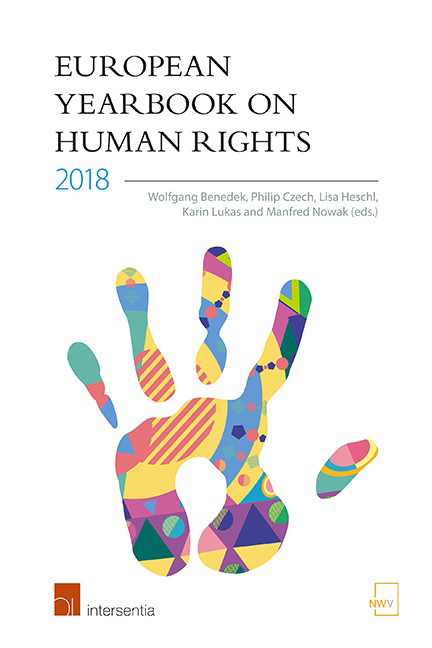Book contents
- Frontmatter
- Scientific Advisory Board
- Editors’ Preface
- Contents
- List of Abbreviations
- List of Contributors
- Part I Topic Of The Year
- Part II Eu
- Part III Coe
- The Jurisprudence of the European Court of Human Rights in 2017
- A Decade of Violations of the European Convention on Human Rights: Exploring Patterns of Repetitive Violations
- The Boundaries to Dialogue with the European Court of Human Rights
- Unprincipled Disobedience to International Decisions: A Primer from the Russian Constitutional Court
- The Impact of ECtHR and CJEU Judgments on the Rights of Asylum Seekers in the European Union: Adversaries or Allies in Asylum?
- The Human Right to Leave Any Country: A Right to be Delivered
- Some Reflections on the Principle of the Best Interests of the Child in European Expulsion Case Law
- Salafism in Europe: A Legal and Political Analysis of Human Rights and Security
- Delays in the Implementation of ECtHR Judgments: The Example of Cases Concerning Electoral Issues
- PART IV OSCE
- Part V Others
- Part VI Book Reviews
- Index
The Human Right to Leave Any Country: A Right to be Delivered
from Part III - Coe
Published online by Cambridge University Press: 31 January 2019
- Frontmatter
- Scientific Advisory Board
- Editors’ Preface
- Contents
- List of Abbreviations
- List of Contributors
- Part I Topic Of The Year
- Part II Eu
- Part III Coe
- The Jurisprudence of the European Court of Human Rights in 2017
- A Decade of Violations of the European Convention on Human Rights: Exploring Patterns of Repetitive Violations
- The Boundaries to Dialogue with the European Court of Human Rights
- Unprincipled Disobedience to International Decisions: A Primer from the Russian Constitutional Court
- The Impact of ECtHR and CJEU Judgments on the Rights of Asylum Seekers in the European Union: Adversaries or Allies in Asylum?
- The Human Right to Leave Any Country: A Right to be Delivered
- Some Reflections on the Principle of the Best Interests of the Child in European Expulsion Case Law
- Salafism in Europe: A Legal and Political Analysis of Human Rights and Security
- Delays in the Implementation of ECtHR Judgments: The Example of Cases Concerning Electoral Issues
- PART IV OSCE
- Part V Others
- Part VI Book Reviews
- Index
Summary
ABSTRACT
The right to leave a country is enshrined in both international human rights law and its European counterpart. It is a right which is independent and does not require the individual exercising it to show that he or she is admissible in some other country. It is exercisable even in the absence of evidence of possible admission to a destination country. However, in Europe (and some other parts of the world) some states are seeking to encourage their neighbours to interfere with people‘s right to leave a country on the grounds that these European states fear that people want to come to their borders. This article examines the right to leave a state from the perspective of international and European human rights law and questions the legality of various efforts to make it dependent on a right of entry to another country.
INTRODUCTION
Human rights law instruments enshrine the right to leave any country, including one‘s own. Article 13(2) of the Universal Declaration of Human Rights contains the first expression of the right. Article 12(2) of the International Covenant on Civil and Political Rights (ICCPR) is the global legally binding instrument enshrining the right to leave. At European level, Article 2(2) of Protocol 4 to the European Convention on Human Rights (ECHR) also expresses this right. The right to leave any country has not gained much attention; neither has it been an object of frequent invocations. However, in light of the current situation where in practice many people are contained in countries of origin and transit, the importance of this right needs to be explained and the challenges to its application clarified.
Historically, the right to leave was included in the catalogue of rights for the purpose of targeting and critiquing the countries on the east side of the Berlin Wall and their restrictions on external mobility. In this context, the right to leave was considered a key indicator of the democratic foundations of states. Reflective of this historical background, the Human Rights Committee General Comment No. 27 on Freedom of Movement, issued ten years after the fall of the Berlin Wall, is framed predominantly from the perspective of countries of departure.
- Type
- Chapter
- Information
- European Yearbook on Human Rights 2018 , pp. 373 - 394Publisher: IntersentiaPrint publication year: 2018
- 2
- Cited by



